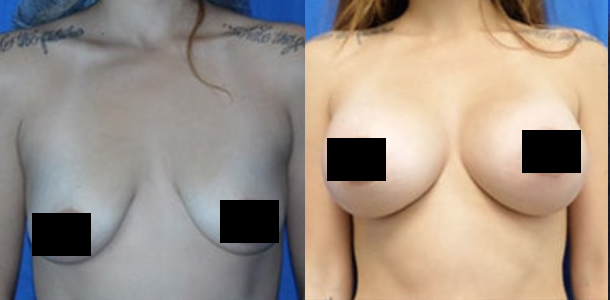Gastric Sleeve
Consultations offered at our three convenient locations in Pomona, Rancho Cucamonga and Apple Valley, CA

A bariatric weight-loss procedure, such as a gastric sleeve, is a surgery to help patients achieve their goal weight after diet and exercise were unsuccessful. Severe obesity is a disease associated with multiple adverse health risks. However, a gastric sleeve procedure can reverse or improve this condition in patients who have been unable to sustain weight loss through non-surgical means. (1)
Unfortunately for a large number of patients who struggle with their weight, the excess strain on the body can do more than just affect your appearance and self-perception. It can also severely limit your quality of life and cause serious health concerns such as hypertension, diabetes and heart disease. While a healthy diet and exercise may allow you to shed some extra pounds, many patients require additional assistance to attain their ideal weight.
With locations in Pomona, and Apple Valley, the healthcare professionals at Pacific Med Health Group can assist you to redefine your appearance and improve your self-confidence. Contact our offices today at (800) 555-5551 to speak to our trained staff, or complete a contact form on our website for more information about bariatric surgery.
Contents
- 1 Bariatric Surgery for Weight-Loss
- 2 Benefits
- 3 Candidates
- 4 Personal Consultation
- 5 Preparation for Gastric Sleeve Surgery
- 6 Gastric Sleeve Procedure in Apple Valley, CA
- 7 Gastric Sleeve Recovery
- 8 Results of Gastric Sleeve Surgery
- 9 Cost of Gastric Sleeve Surgery
- 10 FAQ
- 10.1 How much stomach is removed in a gastric sleeve procedure?
- 10.2 Is a bariatric weight-loss procedure considered major surgery?
- 10.3 Who is Not Suitable for a Gastric Sleeve Procedure?
- 10.4 How heavy can I be to undergo gastric sleeve surgery?
- 10.5 What are the success rates for gastric sleeve surgery?
- 11 References
Bariatric Surgery for Weight-Loss
We all know that leading an active lifestyle is the healthiest way to lose weight. However, the latest estimates are that approximately 34% of adults in the U.S. are obese. (2) Exercise and nutrition counseling sometimes fail to do the trick, necessitating more radical weight loss interventions. Take charge and forge a clear path toward your weight-loss goals by contacting Apple Valley, and Pomona’s comprehensive bariatric surgery providers at (800) 555-555.
Benefits
Bariatric surgery doesn’t just help you lose weight. There are some additional, arguably equally as important benefits which are supported by rigorously tested scientific evidence.
- Remission of type-2 diabetes (3)
- Remission of obstructive sleep apnea (OSA) (4)
- Better cardiovascular health (5)
- Alleviation of depression symptoms (6)
- Relief from joint pain (7)
- Improved fertility in male and female patients (8)
If you want to make a real change in your quality of life, and attain a happier and healthier body weight, let board-certified bariatric surgeon Dr. Lee Au help you achieve your weight-loss goals. We are now offering free virtual consultations to our patients in Southern California. To find out more, fill out this form and one of our helpful staff will address your inquiry at their earliest convenience.
Candidates
Patients who choose gastric sleeve surgery should be prepared to adopt healthy eating habits and lifestyle changes to maintain their ideal weight after the surgery. This type of surgery is generally reserved for obese patients with a body mass index (BMI) of at least 40. The procedure may also be suitable for patients with a BMI of at least 35 who have one or more co-morbidity, including conditions such as high blood pressure or type-2 diabetes, that commonly accompany obesity. (Calculate your BMI below)
Personal Consultation
It is crucial to be frank about the symptoms you have experienced due to obesity during your consultation with Dr. Au. Take the opportunity to discuss any prior medical conditions or drug allergies with him, and outline your personal weight-loss goals so that he can better understand your individual circumstances. He will then tailor a gastric sleeve treatment plan to your needs. Speak to one of our knowledgeable team members at (800) 555-5551 to schedule an appointment, or sign up for a complimentary virtual consultation with Dr. Au.
Preparation for Gastric Sleeve Surgery
Our healthcare team will thoroughly explain every step involved in your treatment plan to make sure you understand what to expect from your procedure. Such a careful and personalized approach to preparing patients for the procedure such as this invariably pays off, as it allows our physicians to avoid any miscommunication over outcomes and unrealistic expectations.
Dr. Au will recommend obtaining a specified target weight before he allows surgery to take place. Patients are recommended to follow a strict pre-op diet for two weeks before gastric sleeve surgery. This diet is specifically designed to decrease your carbohydrate consumption, increase your protein consumption, and reduce your sugar intake.
Gastric Sleeve Procedure in Apple Valley, CA
Gastric sleeve surgery, also known as, ‘sleeve gastrectomy, vertical sleeve, gastric sleeve resection, and tube gastrectomy,’ is a newer type of weight loss surgery, where 60-80 percent of the stomach is removed. As the name suggests, this type of surgery morphs the stomach into a sleeve through incisions around the abdominal area. Performed by an expert bariatric surgeon, gastric sleeve surgery is a major operation which requires significant planning on the part of both doctor and patient. At the beginning of your treatment, Dr. Au will ensure you are comfortable and administer general anesthesia. After the effects of the anesthesia are apparent, Dr. Au will reduce the size of the stomach by skillfully removing around three-quarters of it from your body. What remains is a weight-loss compatible, banana-shaped sleeve which will serve as your newly formed stomach. Many patients opt for this type of procedure because of the minimal scarring and long-term physiological benefits.
Read what our real patients in Apple Valley, and Pomona have to say about Dr. Au here.
What Are The Risks of Gastric Sleeve Surgery?
Potential complications during a gastric sleeve procedure are rare, but if they do occur, they may include perforation of the stomach, internal bleeding, and injury to the spleen. Generally, patients with a higher BMI are at a higher risk of experiencing wound infections, hematomas, and delayed wound healing. In some cases, minor side effects following the procedure may include gastroesophageal reflux disease (GERD) which can be treated successfully with medication. At your personal consultation, Dr. Au will keep you well-informed and provide a detailed outline of the risks and benefits of your gastric sleeve surgery moving forward.
Gastric Sleeve Recovery
The recovery period after your procedure will be mapped out well in advance of your surgery date. Patients should expect to stay in the hospital for a few days. Most people will be able to resume normal activities within two weeks, although full recovery after a gastric sleeve procedure, including the healing of stomach staples, generally takes place over a 6-8 week period. You should refrain from exerting any excessive force with your abdominal muscles, such as lifting heavy weights or conducting rigorous exercise, for one or two months after the procedure. This ensures you give your body a well-deserved rest and the best chance to heal sufficiently. During this period, our surgeons and staff will conduct a follow-up with you to ensure that your recovery is running smoothly.
Results of Gastric Sleeve Surgery
The overall success rate for patients one year after gastric sleeve surgery is a staggering 96.1% (9), making this type of bariatric surgery one of the most popular ways to fight obesity and achieve their goal weight. After the healing process is complete, you will continue to follow the detailed instructions laid out by Dr. Au in your personal treatment plan. Maintaining a strict post-operative diet and exercise routine after treatment is essential. Soon after your treatment you’ll be able to reap the physical and psychological rewards of a healthier weight to look and feel your healthiest self!
Cost of Gastric Sleeve Surgery
The cost of a bariatric surgery at Pacific Med Health Group may vary from patient to patient depending on various patient-specific factors. Fortunately, most insurance companies that cover weight loss surgery will cover the gastric sleeve procedure. We offer free insurance verification and guarantee that our pricing will always be competitive with equivalent services offered by other local providers.
FAQ
How much stomach is removed in a gastric sleeve procedure?
Between 60-80% of the stomach is removed during a gastric sleeve surgery, compared to gastric bypass surgery, which reduces the size of your stomach to roughly that of a walnut.
Is a bariatric weight-loss procedure considered major surgery?
Both gastric sleeve and gastric bypass procedures are classified as major surgeries that carry some intrinsic long- and short-term side-effects. Before your procedure, you should discuss your treatment goals at length with your surgeon to ensure you know the risks and rewards of weight-loss surgery.
Who is Not Suitable for a Gastric Sleeve Procedure?
For your safety and for the safety of your developing fetus, it is not possible for patients who are pregnant to undergo gastric sleeve surgery.
How heavy can I be to undergo gastric sleeve surgery?
Typically, surgeons perform gastric sleeve surgery on patients with a body mass index (BMI) of 40 or above. In some cases, patients with a BMI of between 35-40 who have additional comorbidities such as type-2 diabetes and/or hypertension (high blood pressure) may also be considered suitable candidates. If your BMI is in this range, speak to a board-certified bariatric surgeon about your surgical weight-loss options and find out if a gastric sleeve procedure is a good fit for your circumstances.
What are the success rates for gastric sleeve surgery?
Recent data has revealed that bariatric surgery has a success rate of 96.1% after 1 year, 95.1% after 2 years, 89.5% after 3 years, making it a highly effective and logical weight-loss treatment option for obese patients.(9)
References
- Wolfe, B. M., Kvach, E., & Eckel, R. H. (2016). Treatment of Obesity. Circulation Research, 118(11), 1844–1855. https://doi.org/10.1161/circresaha.116.307591
- Mitchell, N. S., Catenacci, V. A., Wyatt, H. R., & Hill, J. O. (2011). Obesity: Overview of an Epidemic. Psychiatric Clinics of North America, 34(4), 717–732. https://doi.org/10.1016/j.psc.2011.08.005
- KASHYAP, S. R., GATMAITAN, P., BRETHAUER, S., & SCHAUER, P. (2010). Bariatric surgery for type 2 diabetes: Weighing the impact for obese patients. Cleveland Clinic Journal of Medicine, 77(7), 468–476. https://doi.org/10.3949/ccjm.77a.09135
- Currie, A. C., Kaur, V., Carey, I., Al-Rubaye, H., Mahawar, K., Madhok, B., … Khan, O. A. (2021). Obstructive sleep apnea remission following bariatric surgery: a national registry cohort study. Surgery for Obesity and Related Diseases, 17(9), 1576–1582. https://doi.org/10.1016/j.soard.2021.05.021
- Benraouane, F., & Litwin, S. E. (2011). Reductions in cardiovascular risk after bariatric surgery. Current Opinion in Cardiology, 26(6), 555–561. https://doi.org/10.1097/hco.0b013e32834b7fc4
- Susmallian, S., Nikiforova, I., Azoulai, S., & Barnea, R. (2019). Outcomes of bariatric surgery in patients with depression disorders. PLoS ONE, 14(8), e0221576. https://doi.org/10.1371/journal.pone.0221576
- King, W. C., Chen, J.-Y., Belle, S. H., Courcoulas, A. P., Dakin, G. F., Elder, K. A., … Yanovski, S. Z. (2016). Change in Pain and Physical Function Following Bariatric Surgery for Severe Obesity. JAMA, 315(13), 1362. https://doi.org/10.1001/jama.2016.3010
- Moxthe, L. C., Sauls, R., Ruiz, M., Stern, M., Gonzalvo, J., & Gray, H. L. (2020). Effects of Bariatric Surgeries on Male and Female Fertility: A Systematic Review. Journal of Reproduction & Infertility, 21(2), 71–86. Retrieved from https://www.ncbi.nlm.nih.gov/pmc/articles/PMC7253939/
- Hoyuela, C. (2017). Five-year outcomes of laparoscopic sleeve gastrectomy as a primary procedure for morbid obesity: A prospective study. World Journal of Gastrointestinal Surgery, 9(4), 109–117. https://doi.org/10.4240/wjgs.v9.i4.109




